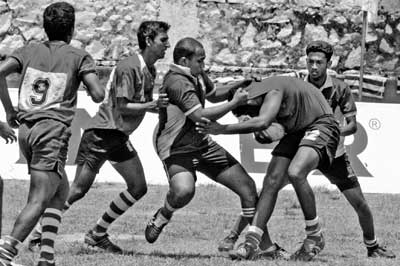
Spare those kids and please guide them
The “Sevens” rugby for schools continued for a second successive week following the Western Province Schools under 20 Seven-a-side tournament. The question that was asked by many was why the leading schools were not there. This was an “All Island Sevens” as they called it. . Yes, indeed it was an All Island sevens tournament. Competing here among the outstation schools was a team from Embilipitiya from Piliyandala and Kandy. Other than for Isipatana and Kingswood College there were no other schools from Group 1 Segment --1 to be seen on the field. The Semi Final was between Ananda and Mahanama while the other was Isipathana against D.S. Senanayake. The other Group 1 Segment--1 side that played was Kingswood who was beaten in the quarter finals by Mahanama College.
According the Organizers S. Thomas’ College who came to the semi-final the previous week dropped out and losing finalist St Josephs College played a virtual second string team. Isipathana won the cup beating Ananda College. They won the game quite comfortably. Nalanda beat St Josephs College to win the plate. The wild gestures and incidents of unwanted foul play was not seen this week. What I did not like was the attitude of the losing team of the plate final. Having lost to somebody who was better than them, on that day, they should have taken the defeat graciously. The unnecessary taunting of the winning team with gestures and a come for a fight sort of verbal exchange should not have been there. You lost on that day; accept it. Juniors with a tomorrow in front must learn to accept defeat. The previous week a sports commentator who is also an old boy of a school described an offending player mentioned the reaction of a master, involved with the game. When the incident was brought to his notice he said “The boy’s father is here why don’t you tell him”. Similarly after the final for the plate I happened to tell a person who I thought was the master (as he was with the team) that the boys should be told to behave and not to fish for trouble. His attitude did not arouse me to accept that the comments will be taken seriously. It is sad that the game is getting into situations not worthy and it should be the responsibility of the authorities to nip the unsavoury behaviour in the bud. Both weeks it has been saints and begs me to ask the question whether the devils have got into the right hand of god the father. Are incidents buoyed through action of coached, parents or old boys because of their expectation? Coaches virtually manage the game from the side lines. Should I say “they play the game from the side lines?” As a coach with experience and ability it is easy to talk to players through every move. Is this very effective? Does it not stifle their gut feeling for the game, and their natural ability? Sometimes the comments are negative. It must be remembered that positive encouragement will give players confidence. When dishing out instructions from the side players will not always receive what you say. And when they don’t seem to do what you are shouting about it make the coach go bonkers? Think whether the players can at all times concentrate on the many instructions you have given. Is it effective to bark instructions at the middle of play and even in the first 30 seconds of the half time break? Also there are and were instances where the coaches as well as others involved so do not keep their emotions under control – panic, anger, frustration and fear are all mind killers. It has to be remembered that players depend on the coach as well as the advisers to be the coolest head on the pitch. . Also it is better that you don’t keep pointing at the referee or make insulting comments at opposing players while chanting “ Gahapiya” " Marapiya’. It distracts the players and draws attention to the possible shortcomings of one person rather than the game in hand. It is also unlikely to have a positive influence on the outcome of the game and is not in the spirit of the game anyway. It is the responsibility of the coach as well as others involved to make that difference. When the whistle blows for the start of the match, it also starts a concentrated period of thought, action and reaction for the coach. Having spent the days, weeks, months before preparing a team for this moment, the coach needs to be prepared, mentally and emotionally. Whether you can find glory in defeat, humility in victory, can you say you really made a difference on the day? When you don’t players mistakenly try to prove a point the wrong way. Looking at the performance of Isipathana the last two weeks I believed they played better because they did not get a non stop barrage of instructions from the coach or others on the bench. The players did use the instinctive abilities they have. They used what they have practiced for weeks and months. It is to learn from their experience that is important. * Vimal Perera is a former Rugby Referee, coach and Accredited Referees Evaluator IRB
|
|
||||||
|| Front
Page | News | Editorial | Columns | Sports | Plus | Financial
Times | International | Mirror | TV
Times | Funday
Times || |
| |
Reproduction of articles permitted when used without any alterations to contents and a link to the source page.
|
© Copyright
2008 | Wijeya
Newspapers Ltd.Colombo. Sri Lanka. All Rights Reserved. |

